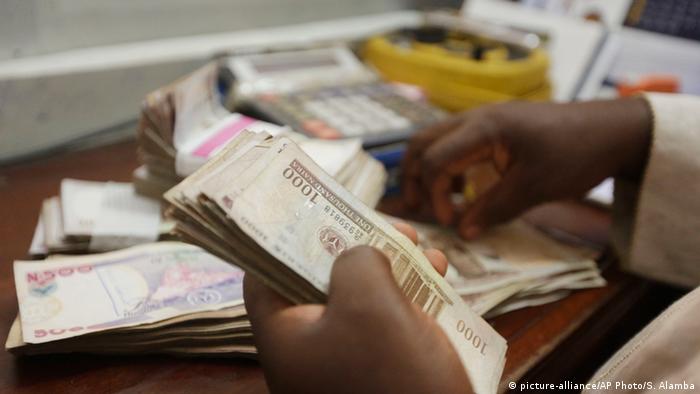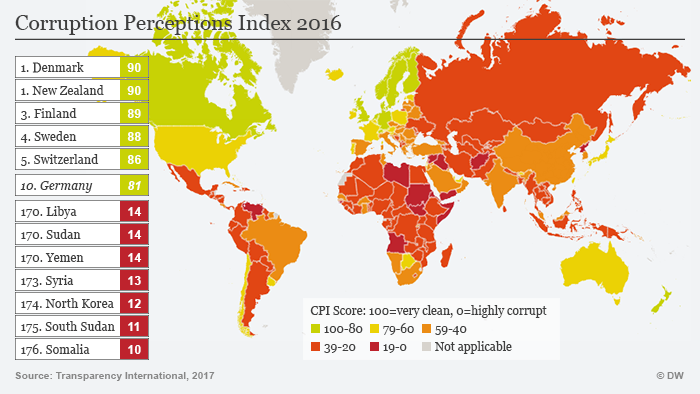Date: Thu, 26 Jan 2017 16:17:19 +0100
'Systemic corruption' in Africa, watchdog says
Cape Verde is seen to have become cleaner, but Ghana more corrupt. Transparency International has just released its 2016 Corruption Perceptions Index. How have African countries moved up and down the league table?
Author Mark Caldwell
Date 26.01.2017
Transparency International's Corruption Perceptions Index ranks 176 countries by their perceived levels of corruption in the public sector. The index ranges from 0 to 100 where the higher the figure the cleaner the country, the lower the figure, the more corrupt the country is perceived to be. Deutsche Welle has been talking to Samuel Kaninda, Transparency International's Africa Regional Advisor.
Q: Deutsche Welle: A number of African countries are perceived as being corrupt. Has the continent become more or less corrupt over the last twelve months or is there no discernible trend?
Samuel Kandinda: There's a mixed picture but overall the situation has not evolved substantially to the effect that the average score for Africa remains quite below the overall average, which points to systemic corruption. So you have the likes of countries which are always below 50 - Nigeria, Zimbabwe, Kenya - and a few others like Somalia which are still remaining at the bottom. You have a few improvers as well, but even those improvements are not substantial enough to lead us to a point to conclude that things have changed substantially for the better.
Q: Who are the improvers?
We have the likes of Cape Verde which is a country which has consistently done well, above average, this time [notching up] a score of 59 out of 100. We have Sao Tome and Principe in Central Africa which has also improved by four points and Burkina Faso has also gained a few points.
Q: Were these improvements the result of government policy, of action by civil society, private initiatives, pressure from foreign donors - why did they happen?
If you look at Cape Verde, Sao Tome and Principe, it is also the governance culture, or systems, in which for a number of years there has been a deliberate move on the side of leaders, especially in Cape Verde, to strengthen governance institutions and to make them transparent, whether you're talking about the tax system or the administration of citizens. So the improvements are the result of general government structures which have been made really transparent and stronger. If you look at Burkina Faso, you should also see improvement in the context of work done by citizens and civil society. You'll recall that President Blaise Compaore was ousted in October 2014, then came a transitional administration for a year that led the country into the first democratic elections in decades. A new law on anti-corruption has been passed in Burkina Faso so there has been an expression of political will on the part of the leadership of the country
Q: Which African countries have slipped down the table, became more corrupt?
One could make a distinction. You have the likes of Somalia, Angola and the Congo - the DRC - that are still ranking quite low, but one surprise that came was Ghana which lost a few points going from 47 to 43. This is surprising because Ghana is known as a democratic country that has seen transfers of power taking place democratically. One example was the recent election in which John Dramani Mahama lost and a new president came to power without any bloodshed or cvil unrest. But one of the major themes in the elections was the fight against corruption, because people increasingly felt that the government wasn't demonstrating commitment or working really for the benefit of citizens in the country.
Samuel Kaninda is Transparency International's Africa Regional Advisor
Interview: Mark Caldwell

